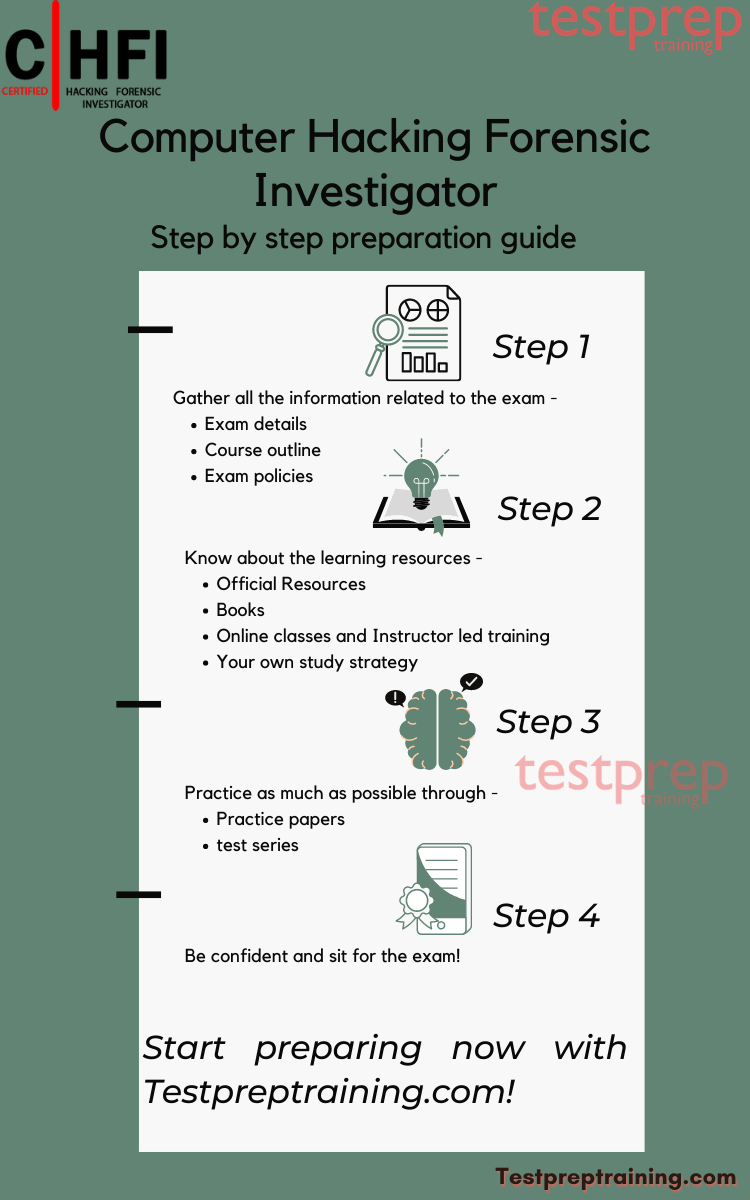In the times of developing technology and increased dependency on technology has given rise to cybercrimes. Do you have the aspirations to become a Computer Hacking Forensic Investigator (312-49)? Are you confused about your preparation strategy? Just relax, as we have the perfect Study Guide for you. This study guide incorporates all the necessary resources to ace the exam. Moreover, it provides the steps to ease your preparations. Before starting your journey you must have all the basic details under check. Therefore, lets first sail through the exam details before embarking on preparation voyage.
What is Computer Hacking Forensic Investigator?
Computer hacking forensic investigation means finding out when someone has hacked into a computer, collecting evidence to report the crime, and checking things to stop it from happening again. This certification can make it easier to get your dream job or move up in your career. It also makes you more noticeable and a preferred choice for employers. CHFI investigators have various ways to find data in a computer or get back files that were deleted, encrypted, or damaged. This is called computer data recovery. The exam aims to check if the candidate can spot signs of someone breaking in and collect the right proof needed for a court case.
Targeted audience
The Computer Hacking Forensic Investigator (312-49) certification targets the following people –
- Firstly, Police and other law enforcement personnel
- Secondly, Defense and Military personnel
- Thirdly, e-Business Security professionals
- Then, Systems administrators
- Moreover, Legal professionals
- Further, Banking, Insurance and other professionals
- Also, Government agencies
- And, IT managers
Computer Hacking Forensic Investigator Requirements
Candidates seeking to take the EC0 312-49 CHFI certification exam, must fulfil either of the following eligibility criterion, proposed by the EC-Council.
- Candidates should have completed an official training, like, instructor-led training or an Academic Learning. The training must be through the EC-Council Authorized Training Center (ATC)
- Or, Candidates without any training experience must prove a minimum of two years of experience in Information Security. Also, they are required to remit an application fee of $100 (USD), which is non-refundable. Lastly, they have to submit the exam eligibility application, to appear for the exam
Study Guide for Computer Hacking Forensic Investigator (312-49)
The 312-49 Computer Hacking Forensic Investigator (CHFI) exam is a globally recognised certification exam. Therefore you must prepare the right strategy to crack the exam. While some are comfortable with self-study, and going through the exam domains, for the preparation. Others prefer enrolling for a training program to get themselves exam ready. This is an individual choice. You must make the right choice, and go for the most suitable way of studying. In this Study Guide, we equip you with the available resources to pass the exam with flying colours.

Step 1 – Review the Exam Objectives
Before starting any journey, it’s important to know what you’re getting into. So, the most crucial part of your preparation is to go over each and every exam objective. To get the most reliable information about the exam, visit the official exam website. Once you’ve checked out the basic exam details, it’s time to dive into the exam guide. Study each and every exam objective. The Computer Hacking Forensic Investigator course outline includes these topics:
Domain 1 – Forensic Science [15%]
This domain covers the objectives, and need of Computer forensics. Also, Cyber Crime, Knowledge of Web Applications, and Web servers Attacks. Then, Email crimes. Also, Cyber Crime Investigation. Finally, Computer Forensics Investigation Methodology.
Domain 2 – Regulations, Policies and Ethics [10%]
This domain focuses on Searching and Seizing Computers with and without a Warrant. Laws and Acts against Email Crimes, pertaining to Log Management. Then, Laws and Acts against Email Crimes. Also, General Ethics While Testifying
Domain 3 – Digital Evidence [20%]
This domain includes understanding the types of digital evidence. Then, the rules of evidence. Knowledge of Electronic Evidence: Types, and Collecting Potential Evidence. Also, understanding Electronic Crime, and Digital Evidence Consideration by Crime Category. Then, the basic understanding of the Mobile operating systems, and File Systems – Windows, Linux, Mac OS X, and RAID Storage system. Lastly, analyzing logs, email headers, and malware
Domain 4 – Procedures and Methodology [20%]
Most importantly, this domain covers the Investigating Computer Crime. Then, knowing the Digital Evidence Examination Process. Understanding the basics, meaning, and role of the first responder. Also, the knowledge of data acquisition, and duplication. Defeating anti-forensic techniques. Finally, Network Forensics (Intrusion Detection Systems (IDS)).
Domain 5- Digital Forensics [25%]
It focuses on Data recovery, and Forensics of file systems – Windows, Linus, and MAC. Steganography, and Steganalysis. Also, image file forensics. Practice in Investigating logs, network traffic, wireless attacks, web attacks, and email crime violation. Moreover, the knowledge of mobile, cloud, and malware forensics
Domain 6 – Tools/ Systems/ Programs [10%]
It is much focused on the First Responder Toolkit, Knowledge of tools in Windows forensics, data acquisition, and anti-forensics defense. Also, practice of stenography, database forensics, password cracking, network security, cloud, and malware forensics tools.
Step 2 – Explore the Learning Resources
Getting through the exam can be simple if you pick the right materials. Be sure they’re accurate and trustworthy. The materials you choose will decide how well you get ready and pass the exam. So, be cautious when you select your study materials. There are many options available, and here are some recommended ones:
Refer Official resources
There are some resources that are made available by the official site. These are the most authentic resources in terms of syllabus. But in terms of quality, you can find even better resources at many educational sites. These are the list of resources officially available, you can visit official site to know more about them –
- To begin with, iLearn (Self-Study)
- Secondly, iWeek (Live Online)
- Thirdly, Master Class
- Also, Training Partner (In Person)
Build your Own Strategy
Prepare your own strategy for study. Self-study is the key that will help you score more and will lead to perfection. Categorise the Computer Hacking Forensic Investigator syllabus into the parts which demands hands-on training and which is theoretical. Break the big parts into smaller one and then try to learn them. This will enable you to grasp things easily. Always make sure to never skip classes and keep your practice regular. Make notes and keep revising time to time.
Learn with your best friends- Books!


Books are indeed the best-valued resource that is readily available at ease. You can refer to any book of your choice or can go for those as prescribed by the open group. Remember to match your syllabus and prepare in the right direction. Some Computer Hacking Forensic Investigator book that can be used for the preparation are –
- Computer Hacking Forensic Investigator All-in-One Exam Guide by Charles L. Brooks
- Computer Forensics: Investigation Procedures and Response (CHFI): EC-Council
Discover Online classes and Instructor Led Training
There are many online resources available for studies such as online classes and online instructor-led courses. Many sites today offer the preparation sets such as classes with test series and practice papers which are readily available and are a reliable source. You can also take the Computer Hacking Forensic Investigator training classes prescribed on the official site. The instructor-led courses are interactive enough to clear your doubts and helps you prepare thoroughly.
Join Online Study Forums
Discussion is a great way for people to connect over shared experiences. This is to ensure that the members stay engaged. A key part of your communication plan could be an online forum. Collaboration can help bring out the creative sides of your team members, as you can work together and bring new ideas to the table. It gives you a platform to express your views and creativity and hence train you. Moreover, this will not only be beneficial in the exam prep but will also help in clearing your doubts.
Step 3 – Evaluate with Practice Tests
Sample papers and test series are one way out to identify the loopholes in your preparation and let you prepare in the best possible way. They build your confidence and also make you familiar with the exam pattern so that you don’t panic on the exam day. Practice as many Computer Hacking Forensic Investigator exam questions and take as many test series as you can as you will be able to handle the tricky part of the exam.
Training your brain is really important. Practice tests help your brain get used to the real exam. Besides what you know, many things can influence how you do in the exam. This includes your confidence, how fast you work, understanding how the scoring works, being physically and mentally alert, staying focused, and more. Start practising Computer Hacking Forensic Investigator exam questions now!



